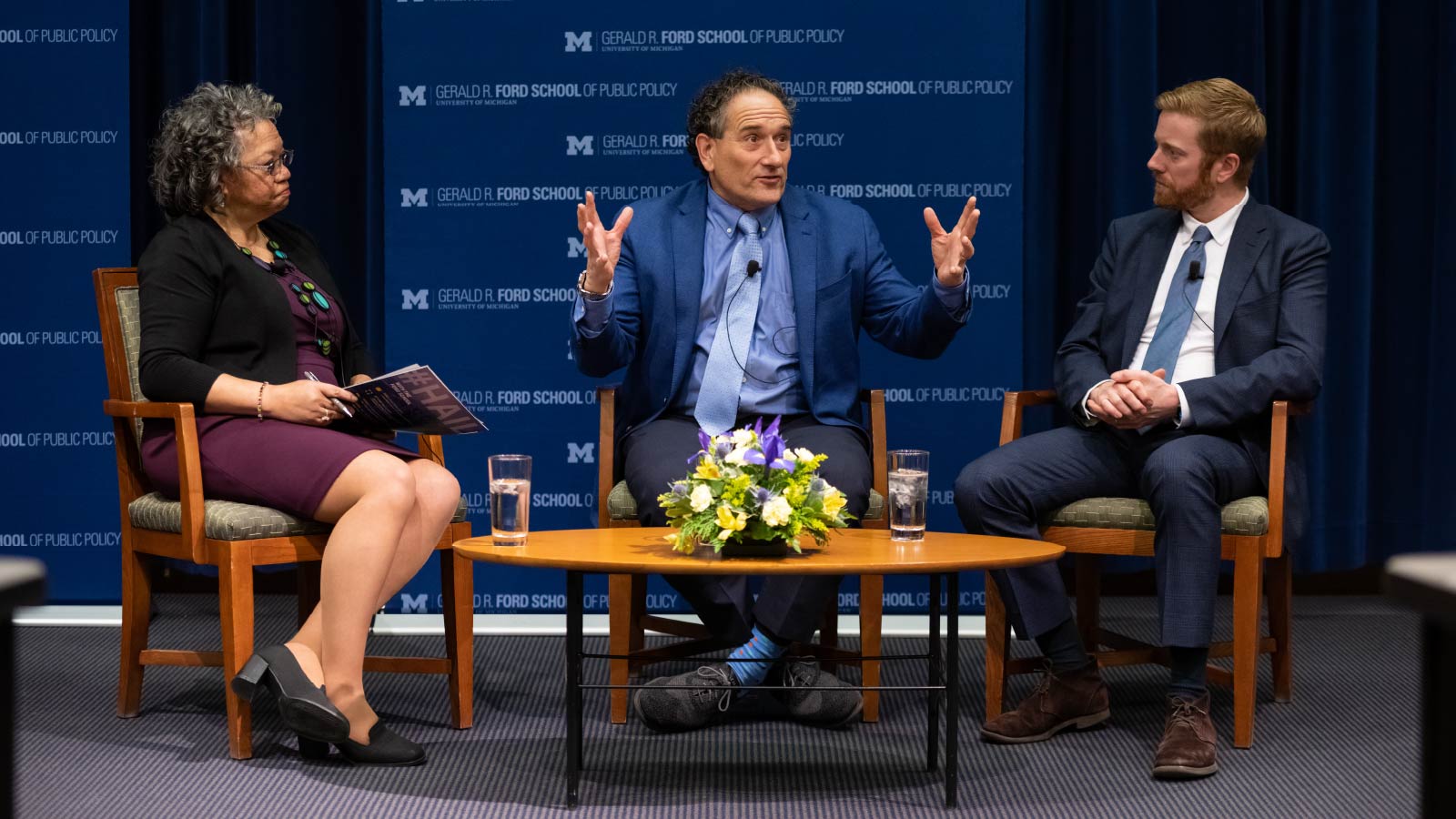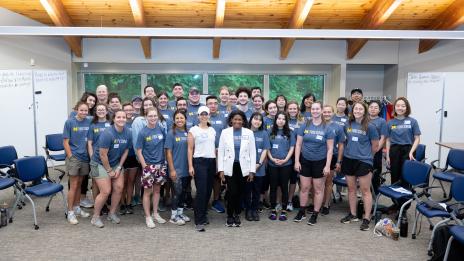By Madeline Swanson | Photos by the Gerald R. Ford School of Public Policy
We witness debates in polarized public discourse, amongst politicians, and between friends and family—discussions that can, oftentimes, brim with vitriol and negativity.
Jenna Bednar (AB ’90), faculty director of UMICH Votes and Democratic Engagement, is not a fan of these types of deliberations. Rather, she said, she values dialogue that welcomes a range of perspectives, where debate is not the purpose of the conversation.
“Debates are set up to have a winner and a loser—you have to pick a side. I prefer discussions where we have differing perspectives, but we also have agreement,” Bednar said. “And even with different viewpoints, we can say, ‘I appreciate the way you are thinking through this.’ There is the opportunity to model respect and learn across differences.”
At the University of Michigan, there is a renewed emphasis on civil discourse and modeling considerate conversations in an effort to bridge the divide between people with opposing views. At the heart of this movement is a growing coalition of educators, leaders, students, and everyday citizens committed to fostering respectful and constructive dialogue.
Since its founding in 1914, U‑M’s Gerald R. Ford School of Public Policy has been a leader in this work. This year, the Ford School is launching the Resilient Democracies initiative, which will include classroom discussions, an ongoing speaker series devoted to bipartisan conversations, and leadership training for students.
Born out of a recognition that today's most pressing challenges require more than technical solutions, Bednar said, Resilient Democracies seeks to engage students, faculty, staff, and the broader community in meaningful dialogue across ideological, cultural, and experiential lines. At its heart, this initiative underscores the belief that policy solutions must be inclusive—considering diverse perspectives—to be truly effective and equitable.
“It's this kind of respect for your opponent that I think athletics models beautifully,” Bednar said. “I would like to develop this parallel in the democratic universe where we respect people whose opinions differ from our own. And we believe it’s a teachable thing—learning how to listen, how to appreciate, how to value, and how to check yourself and intentionally find points of connection.”
Whether students enroll in public policy courses about leading across differences, participate in peer-to-peer conversations that challenge their views of the world, or find ways to eventually put this knowledge into practice in their different careers, the Ford School provides a number of opportunities to engage in this work.
“Students should get an opportunity in the classroom setting to practice it, but to witness leaders modeling it, to me, pushes back against what has felt like a society and media environment that increasingly highlights provocation,” Bednar said.
“I believe that opportunities like interning and working within the public sector are vital to recognizing how important it is to listen and then find what you have in common.”
The Conversations Across Differences speaker series at the Ford School, launched in 2021, has already made a significant impact on campus and beyond. The program includes a variety of formats—lecture series, panel discussions, small-group conversations, and workshops. These events are designed not just to inform, but also to engage participants actively, encouraging them to listen, question, and reflect.
Started in 2022, Policy Talks @ the Ford School brings together panels of political scientists, policymakers, government officials, and other thought leaders to discuss topics ranging from the Flint water crisis to the war in Ukraine.
In addition, “fireside chats”—hosted by Bednar and Celeste Watkins-Hayes, the Joan and Sanford Weill Dean of Public Policy at the Ford School—bring faculty, politicians, and others with opposing viewpoints together to discuss policy and other topics.
These programs have brought leaders such as Michigan Governor Gretchen Whitmer, former secretaries of state Hillary Clinton and Condoleezza Rice, and FBI Director Christopher Wray, among many others, to campus. Bednar said the goal is to create a powerful experience for students by showcasing leaders with a partisan balance who are committed to respectful dialogue.
“Our goal is to bring into the building speakers and programming, sometimes as panels, that will encourage students to just think a little bit more deeply and appreciate the complexity of particular issues, and help them to recognize and value differences,” she said.
If you believe in democracy, Bednar said, you want to be able to believe in “the capacity of the people to work together to solve problems that they have in common.”
“And so that means identifying problems that you have and agree on as being a problem, and then thinking through solutions and what it would take to implement those solutions,” she said. “All of that requires some way of finding the points that you have in common.”






